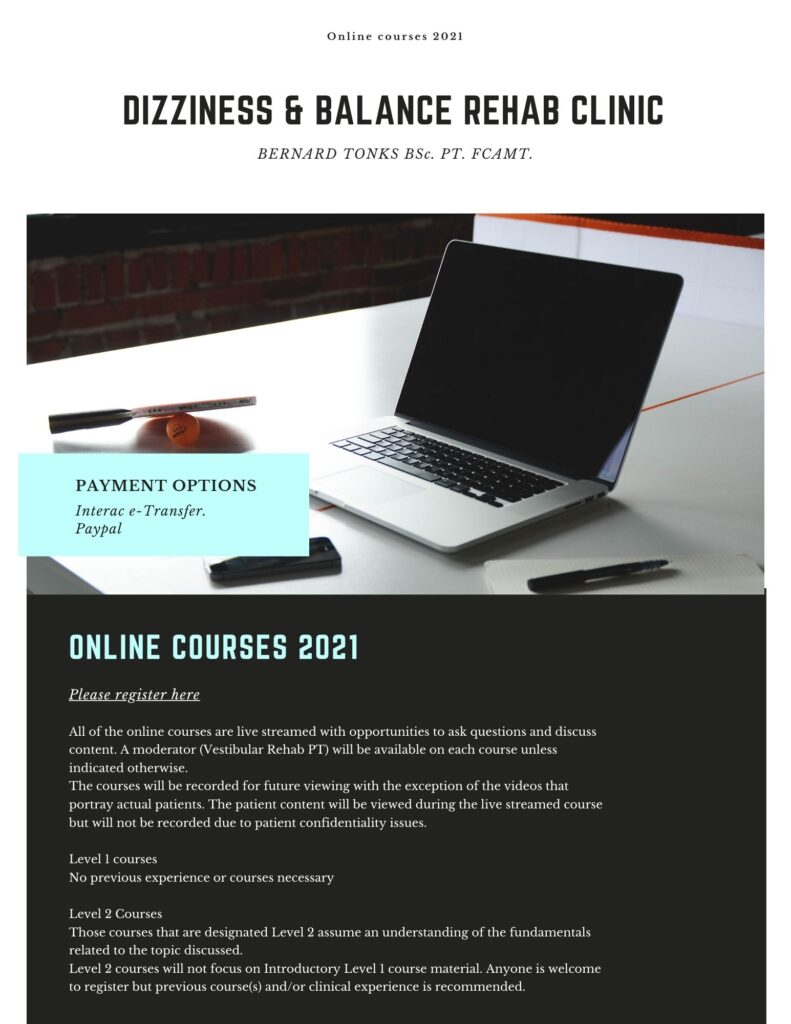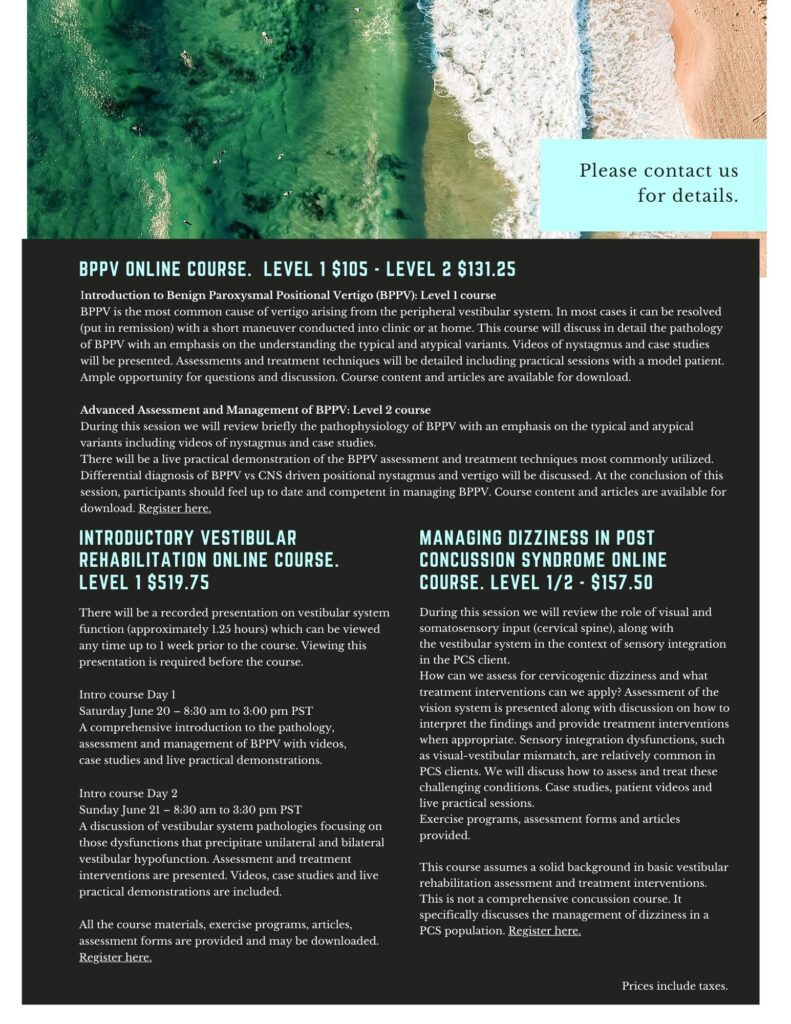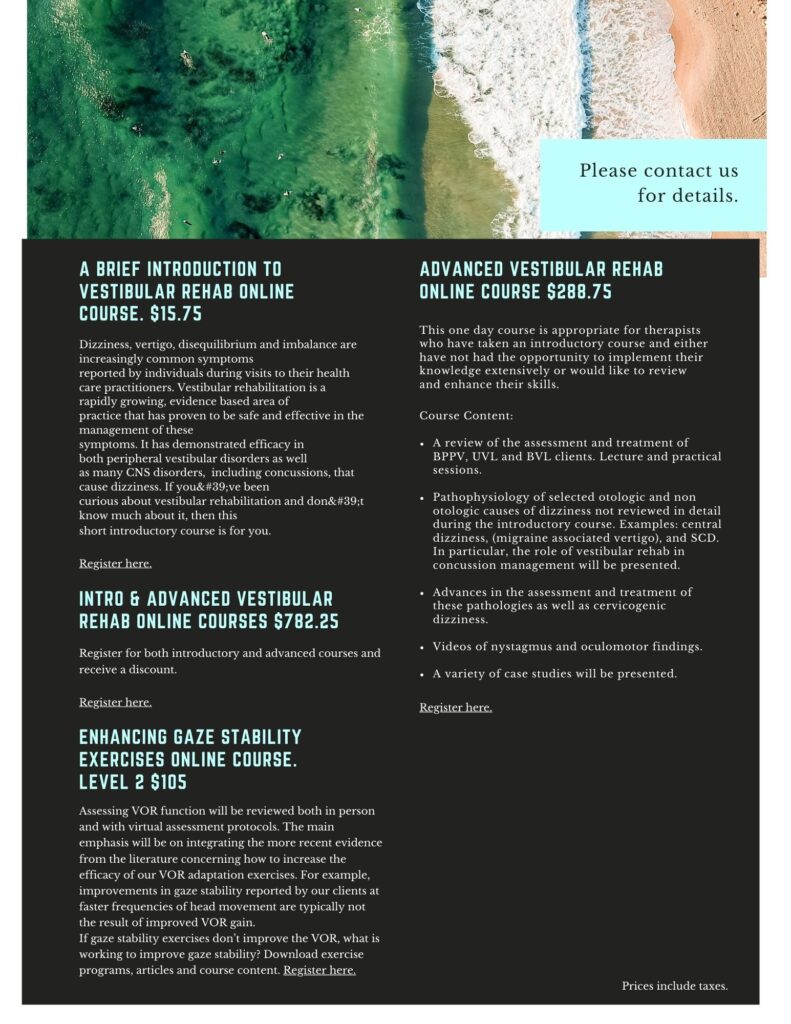Courses
All of the online courses are live streamed with opportunities to ask questions and discuss content. A moderator (Vestibular Rehab PT) will be available on each course unless indicated otherwise.
The courses will be recorded for future viewing with the exception of the videos that portray actual patients. The patient content will be viewed during the live streamed course but will not be recorded due to patient confidentiality issues.
Level 1 courses
No previous experience or courses necessary
Level 2 Courses
Those courses that are designated Level 2 assume an understanding of the fundamentals related to the topic discussed.
Level 2 courses will not focus on Introductory Level 1 course material. Anyone is welcome to register but previous course(s) and/or clinical experience is recommended.
BPPV online course. LEVEL 1 – Level 2
Introduction to Benign Paroxysmal Positional Vertigo (BPPV): Level 1 course
BPPV is the most common cause of vertigo arising from the peripheral vestibular system. In most cases it can be resolved (put in remission) with a short maneuver conducted into clinic or at home. This course will discuss in detail the pathology of BPPV with an emphasis on the understanding the typical and atypical variants. Videos of nystagmus and case studies will be presented. Assessments and treatment techniques will be detailed including practical sessions with a model patient. Ample opportunity for questions and discussion. Course content and articles are available for download.
Advanced Assessment and Management of BPPV: Level 2 course
During this session we will review briefly the pathophysiology of BPPV with an emphasis on the typical and atypical variants including videos of nystagmus and case studies.
There will be a live practical demonstration of the BPPV assessment and treatment techniques most commonly utilized. Differential diagnosis of BPPV vs CNS driven positional nystagmus and vertigo will be discussed. At the conclusion of this session, participants should feel up to date and competent in managing BPPV. Course content and articles are available for download.
Introductory Vestibular Rehabilitation online course. Level 1
There will be a recorded presentation on vestibular system function (approximately 1.25 hours) which can be viewed any time up to 1 week prior to the course. Viewing this presentation is required before the course.
Intro course Day 1
A comprehensive introduction to the pathology, assessment and management of BPPV with videos,
case studies and live practical demonstrations.
Intro course Day 2
A discussion of vestibular system pathologies focusing on those dysfunctions that precipitate unilateral and bilateral vestibular hypofunction. Assessment and treatment interventions are presented. Videos, case studies and live practical demonstrations are included.
All the course materials, exercise programs, articles, assessment forms are provided and may be downloaded.
MANAGING Dizziness in Post Concussion Syndrome ONLINE COURSE. Level 1/2 – $157.50
During this session we will review the role of visual and somatosensory input (cervical spine), along with
the vestibular system in the context of sensory integration in the PCS client.
How can we assess for cervicogenic dizziness and what treatment interventions can we apply? Assessment of the vision system is presented along with discussion on how to interpret the findings and provide treatment interventions when appropriate. Sensory integration dysfunctions, such as visual-vestibular mismatch, are relatively common in PCS clients. We will discuss how to assess and treat these challenging conditions. Case studies, patient videos and live practical sessions.
Exercise programs, assessment forms and articles provided.
This course assumes a solid background in basic vestibular rehabilitation assessment and treatment interventions. This is not a comprehensive concussion course. It specifically discusses the management of dizziness in a PCS population.
A Brief Introduction to Vestibular Rehab ONLINE course.
Dizziness, vertigo, disequilibrium and imbalance are increasingly common symptoms
reported by individuals during visits to their health
care practitioners. Vestibular rehabilitation is a rapidly growing, evidence based area of
practice that has proven to be safe and effective in the management of these
symptoms. It has demonstrated efficacy in both peripheral vestibular disorders as well
as many CNS disorders, including concussions, that cause dizziness. If you’ve been
curious about vestibular rehabilitation and don't know much about it, then this
short introductory course is for you.
Advanced Vestibular Rehab ONLINE course
This one day course is appropriate for therapists who have taken an introductory course and either have not had the opportunity to implement their knowledge extensively or would like to review
and enhance their skills.
Course Content:
- A review of the assessment and treatment of BPPV, UVL and BVL clients. Lecture and practical sessions.
- Pathophysiology of selected otologic and non otologic causes of dizziness not reviewed in detail during the introductory course. Examples: central dizziness, (migraine associated vertigo), and SCD. In particular, the role of vestibular rehab in concussion management will be presented.
- Advances in the assessment and treatment of these pathologies as well as cervicogenic dizziness.
- Videos of nystagmus and oculomotor findings.
- A variety of case studies will be presented.
Intro & Advanced Vestibular Rehab ONLINE courses
Register for both introductory and advanced courses and receive a discount.
Enhancing Gaze Stability Exercises online course. Level 2
Assessing VOR function will be reviewed both in person and with virtual assessment protocols. The main emphasis will be on integrating the more recent evidence from the literature concerning how to increase the efficacy of our VOR adaptation exercises. For example, improvements in gaze stability reported by our clients at faster frequencies of head movement are typically not the result of improved VOR gain.
If gaze stability exercises don’t improve the VOR, what is working to improve gaze stability? Download exercise programs, articles and course content.


